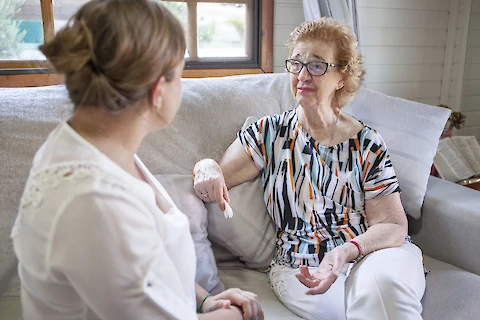
Dementia brings challenges and a heart-wrenching reality for many families, especially for adult children who find themselves in the role of caregiver for their senior parents. As your parent's dementia progresses and becomes more severe, it's crucial to remember the importance of prioritizing self-care and setting boundaries to maintain your well-being. In this blog post, we'll discuss the signs of worsening dementia, how to recognize your limitations as a caregiver, and how to balance self-care with your new responsibilities. We'll also explore when to consider hiring a caregiver who will help support your parent's needs, reassuring you that they're receiving the best care possible.
Signs of Worsening Dementia
Some common signs of worsening dementia include increased confusion, memory loss, mood swings, and difficulty with daily tasks. Watch for these signs and prepare to adjust your care plans accordingly, ensuring that your loved one receives the appropriate support they need.
Recognizing Your Limitations as a Caregiver
Despite your desire to take care of all your senior parent's needs, as their dementia worsens, you need to recognize when to seek help. You might find it challenging to handle a parent who becomes physically aggressive or requires round-the-clock supervision. Setting boundaries and asking for help from friends, family, or professionals is essential in these situations. Acknowledging these limitations does not indicate weakness but rather a realistic approach to ensure your well-being and that of your elderly parent.
Prioritizing Self-Care
As a caregiver, you may deal with overwhelming responsibilities, leaving you little time or energy for self-care. But to properly care for your parent, you must also care for yourself. Start by incorporating self-care practices into your daily routines, such as setting aside time for your hobbies or interests, exercising regularly, and ensuring you get enough rest. Prioritizing self-care may seem challenging at first, but taking the time to recharge will help you maintain your physical and emotional health, making you a more effective caregiver in the long run.
In addition to self-care practices, you should also work to maintain social connections. Reach out to friends and family for support, and consider joining support groups or online forums for caregivers of elderly parents with dementia. Sharing your experiences and learning from others in similar situations significantly affects how you cope with the challenges associated with caregiving.
Consider a Professional Caregiver
As your parent's dementia advances and your well-being becomes harder to maintain, you might consider hiring a professional caregiver. Some benefits professional care offers include:
- Providing your senior parent with the best care
- Time to focus on your health
- Peace of mind that you're making the right decision for you and your parent
When searching for a qualified, trustworthy caregiver, make sure to conduct thorough research, ask for recommendations, and interview several candidates to ensure that you find someone who is the right fit for your family and your parent's unique needs.
We Want to Help
If you're struggling to balance caregiving responsibilities while maintaining your well-being, Senior Helpers South Orange County wants to help. Our compassionate, professional caregivers can support your senior parent's needs, allowing you to focus on self-care. We serve seniors in the Irvine, Orange County, Santa Ana, and Tustin areas. Contact us today to learn more about our services.